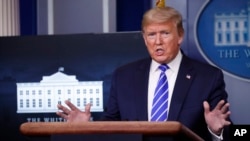The White House readied new guidelines Monday on coronavirus testing and reopening businesses as it sought to regain its footing after weeks of criticism and detours created in part by presidential sideshows. But President Donald Trump appeared reluctant to cede the spotlight, with on-off-on plans for a press conference to capture the flurry of action.
As part of the effort, the Centers for Disease Control and Prevention was set to release new priorities for virus testing, including people who show no symptoms but are in high-risk settings.
The White House was unveiling what it described as a comprehensive overview of its efforts to make enough tests for COVID-19 available so states can sample at least 2.6% of their populations each month.
The action came as the White House tries to shift its approach after an erosion in public support for the president. What had been his greatest asset in the reelection campaign — his ability to dominate headlines with freewheeling performances at his daily briefings — is increasingly being seen as a liability. At the same time, new Republican Party polling shows Trump's path to a second term depends on the public's perception of how quickly the economy rebounds from the state-by-state shutdowns meant to slow the spread of the virus.
Days after he set off a firestorm by publicly musing that scientists should explore the injection of toxic disinfectants as a potential virus cure, Trump said he found little use for his daily task force briefings, where he has time and again clashed with medical experts and reporters. Trump's aides had been trying to move the president onto more familiar and, they hope, safer, ground: Talking up the economy in more tightly controlled settings.
But hours after the White House scrubbed the nightly briefing from the official White House schedule, it reversed course.
"UPDATE: The White House has additional testing guidance and other announcements about safely opening up America again. President @realDonaldTrump will brief the nation during a press conference this evening,"
White House spokeswoman Kayleigh McEnany tweeted.
McEnany had said earlier that instead of holding a briefing, Trump would be meeting with retail CEOs. She said briefings would be held later in the week, but, "they might have a new look to them, a new focus to them."
"We're entering a phase of looking to reopen the country and with that, the president will be focusing a lot on the economy," she said.
Among the planned announcements is a new "testing blueprint" for states. It includes a focus on surveillance testing as well as "rapid response" programs to isolate those who test positive and identify those with whom they came in contact. The administration aims to have the market "flooded" with tests for the fall, when COVID-19 is expected to recur alongside the seasonal flu.
Many of the administration's past pledges and goals on testing have not been met.
The CDC also has been working on more detailed guidelines on reopening schools, restaurants and other establishments that could be released as soon as Monday.
Draft guidelines sent by the CDC to Washington include a long list of recommendations for organizations as they begin to reopen, such closing break rooms at offices, schools spacing desks six feet apart and restaurants using disposable plates and menus. The draft guidance was obtained by The Associated Press from a federal official who was not authorized to release it.
Some states have started to ease closure orders, and Trump is expected to spend coming days highlighting his administration's efforts to help businesses and employees. Aides said the president would hold more frequent roundtables with CEOs, business owners and beneficiaries of the trillions of dollars in federal aid already approved by Congress, and begin to outline what he hopes to see in a future recovery package.
Trump last left the White House complex a month ago, and plans are being drawn up for a limited schedule of travel within the next few weeks, aides said. It would be a symbolic show that the nation is beginning to reopen.
The shift comes in conjunction with what the White House sees as encouraging signs across the country, with the pace of new infections stabilizing and deaths declining.
Still, medical experts warn that the virus will continue to haunt the country at least until a vaccine is developed. And they say the risk of a severe second wave is high if social distancing measures are relaxed too quickly or if testing and contact tracing schemes aren't developed before people return to normal behaviors.
The White House has considered whether to continue to hold news briefings in a modified form without Trump, an effort to restore confidence in the government response so the public would be comfortable resuming more normal activities.
Worries are growing among Republicans and Trump allies over the president's increasingly erratic handling of the coronavirus crisis.
Though the White House and the president's re-election team have resolutely projected outward confidence, a number of Trump's confidants have argued for a course correction aimed at retaining the White House and keeping the Senate from slipping from the GOP's hands, according to four current and former campaign and administration officials.
For weeks, Republicans have grown concerned that Trump's daily briefings were doing him grievous political damage. Though Trump cherished the TV ratings, the modest polling bump he received in the early days of the pandemic has vanished amid a flurry of misstatements and partisan fights.





